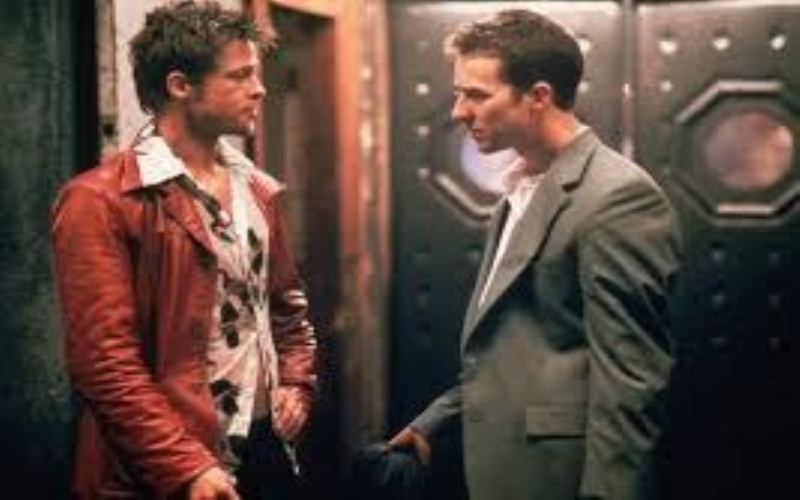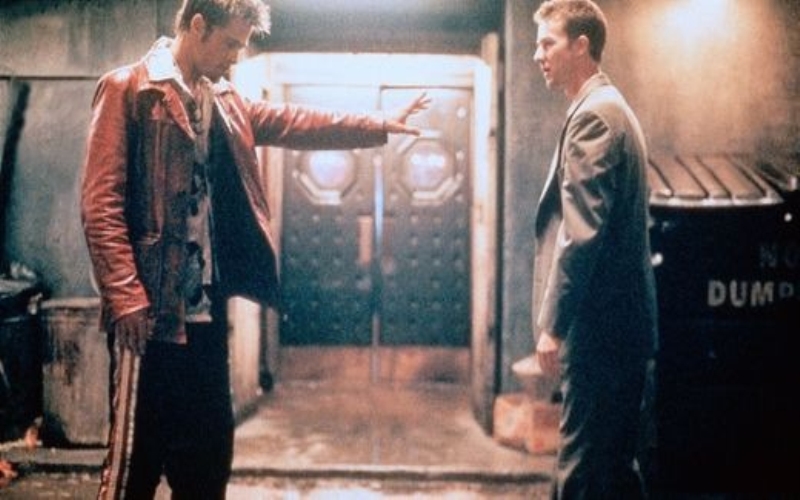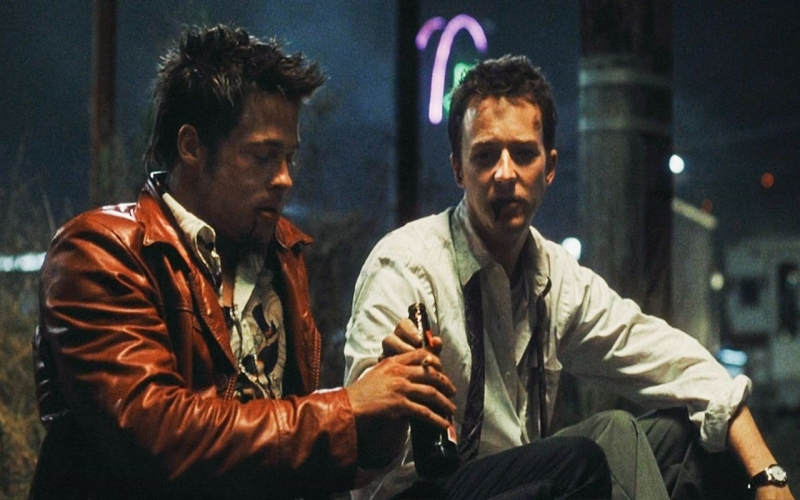
Fight Club, directed by David Fincher and based on Chuck Palahniuk’s novel, is a genre-defining psychological thriller that has transcended its 1999 release to become a cult classic. With its layered narrative, brilliant performances, and philosophical undertones, the film is a masterful exploration of identity, consumerism, and the rebellion against societal norms.
Overview of Fight Club
The title Fight Club refers to an underground group where men channel their frustrations and existential crises through physical fights. However, beneath its gritty exterior lies a deeply introspective and provocative narrative that challenges traditional notions of identity, materialism, and conformity.
The Plot: An Explosive Journey of Self-Discovery
The story follows an unnamed protagonist, referred to as The Narrator (Edward Norton), a disillusioned corporate employee suffering from insomnia and existential despair. His life changes when he meets the enigmatic and anarchistic Tyler Durden (Brad Pitt), who introduces him to the idea of a “fight club,” a space where men can reclaim their primal instincts and confront their inner struggles.
As the club grows into a revolutionary movement, the lines between reality and delusion blur, culminating in a shocking twist that redefines the entire narrative. Fight Club is both a visceral and cerebral experience, leaving audiences questioning the constructs of modern society.
The Cast: Iconic Performances

The cast of Fight Club delivers groundbreaking performances that elevate the film’s impact:
- Edward Norton as The Narrator: Norton’s nuanced performance captures the vulnerability, frustration, and transformation of his character, making him the emotional core of the film.
- Brad Pitt as Tyler Durden: Brad Pitt’s portrayal of the charismatic and chaotic Tyler Durden is unforgettable, embodying the film’s anarchic spirit and philosophical undertones.
- Helena Bonham Carter as Marla Singer: Helena’s performance as the eccentric and self-destructive Marla adds depth and complexity to the story, serving as both a foil and a connection for the protagonist.
- Meat Loaf as Robert “Bob” Paulson: Meat Loaf delivers a poignant performance as a former bodybuilder battling personal demons, adding a touch of humanity to the chaos.
- Jared Leto as Angel Face: Jared’s role, though minor, leaves a lasting impression as a devoted follower of Tyler Durden’s vision.
Direction and Cinematic Brilliance
David Fincher’s direction is a masterclass in storytelling, blending gritty realism with surrealistic elements to create a visually and emotionally immersive experience. His ability to delve into the psyche of the characters while maintaining a gripping narrative ensures that Fight Club remains relevant and thought-provoking.
The screenplay by Jim Uhls captures the essence of Palahniuk’s novel, translating its philosophical and psychological depth onto the screen with precision. The dialogues are sharp, memorable, and laced with dark humor, encapsulating the film’s rebellious tone.
Cinematography and Visual Appeal
The cinematography by Jeff Cronenweth is striking, capturing the grimy and chaotic world of the characters through dynamic framing and innovative camera techniques. The use of dark color palettes and high-contrast lighting enhances the film’s gritty aesthetic, mirroring the protagonist’s psychological turmoil.
Music and Background Score
The music, composed by The Dust Brothers, is a defining feature of the film, blending electronic beats with atmospheric sounds to create a soundtrack that perfectly complements the film’s chaotic energy and introspective moments. Tracks like “Where Is My Mind?” by Pixies have become iconic in association with the film.
IMDb Rating and Audience Reception
Fight Club holds an exceptional 8.8/10 on IMDb, cementing its status as one of the most acclaimed films of all time. While initially polarizing among critics, the film has since been celebrated for its daring narrative, cultural relevance, and philosophical depth. It continues to resonate with audiences, sparking discussions about identity, capitalism, and societal norms.
Budget and Box Office Performance

Budget
The production budget for Fight Club was approximately $63 million, with significant investments in high-quality production design, innovative visual effects, and a stellar cast.
Box Office Collection
Upon its release, Fight Club grossed $101 million worldwide, making it a moderate financial success. However, its cultural impact far surpasses its initial box office performance, with DVD and Blu-ray sales contributing significantly to its long-term popularity and revenue.
What Makes Fight Club Unique?
- Philosophical Depth: The film’s exploration of existential themes and societal critiques remains relevant and thought-provoking.
- Iconic Performances: Edward Norton and Brad Pitt deliver some of the most memorable performances of their careers.
- Visual Storytelling: Fincher’s direction and Cronenweth’s cinematography create a gritty and immersive visual experience.
- Cultural Impact: Fight Club has become a cultural phenomenon, inspiring countless discussions, analyses, and interpretations.
- Timeless Appeal: The film’s themes of identity, rebellion, and societal critique ensure its enduring relevance.
Critics’ Reviews
While some critics initially found the film’s violence and anarchic tone controversial, Fight Club has since been hailed as a masterpiece. Many have praised Fincher’s direction, the performances, and the film’s ability to provoke and challenge conventional norms. The consensus is that Fight Club is a bold and groundbreaking work of art.
Conclusion
Fight Club is more than just a film—it’s a cultural statement that challenges audiences to question societal norms and rediscover their individuality. With its gripping narrative, stellar performances, and profound themes, it remains a timeless and transformative cinematic experience. Whether you’re a fan of psychological thrillers or thought-provoking dramas, Fight Club is a must-watch.